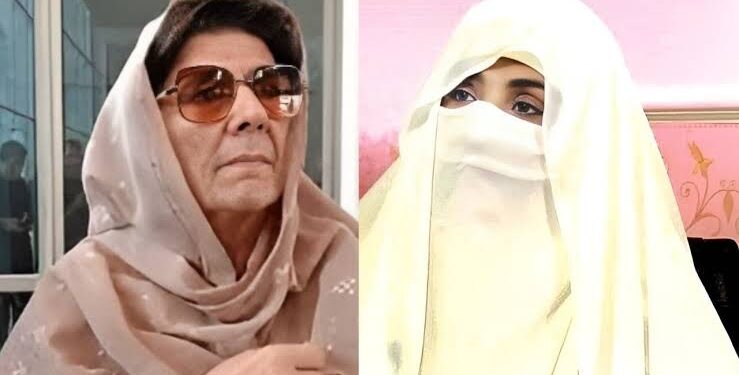Recent political developments have seen Bushra Bibi and Aleema Khan, the wife and sister of PTI founder Imran Khan, take center stage in politics. Known previously for their roles behind the scenes, they has now become more visible in the party’s leadership. Bushra Bibi has presided over several meetings in Khyber Pakhtunkhwa and issued statements that stirred international debate, while Aleema Khan has also stepped up as a key figure.
This shift comes amidst a leadership crisis within the PTI, where many senior members are either imprisoned or in hiding due to ongoing political crackdowns. The move is seen by some as an act of necessity, with Imran Khan relying on his family to fill the political vacuum.
However, this involvement contradicts Imran Khan’s long-held stance against hereditary politics, which he criticized in his opponents, particularly the Sharif family. His past rhetoric targeting the inclusion of Maryam Nawaz and Kulsoom Nawaz in politics now seems at odds with the current strategy involving his wife and sister.
A Historical Trend in Pakistani Politics
The participation of women in political roles, often due to crises, is not a new phenomenon in Pakistan. History offers numerous examples where women from prominent political families stepped forward during critical times.
Fatima Jinnah, sister of Quaid-i-Azam Muhammad Ali Jinnah, stands as a trailblazer. Despite staying behind the scenes during her brother’s lifetime, she emerged as a political figure in the 1960s, contesting against Ayub Khan in a controversial election. Despite being labeled a ‘traitor’ by state-sponsored propaganda, she remains a revered figure in Pakistan’s history.
Similarly, Benazir Bhutto, groomed by her father, Zulfikar Ali Bhutto, rose to prominence after his demise. Alongside her mother, Nusrat Bhutto, she led the PPP through years of persecution and exile before reclaiming power. Benazir’s political journey, marked by resilience, ended tragically with her assassination in 2007.
Other notable figures include Begum Nasim Wali Khan, who led the National Awami Party after her husband’s arrest, and Kulsoom Nawaz, who fought for her husband Nawaz Sharif’s release during Pervez Musharraf’s regime.
Controversy and Criticism
Bushra Bibi and Aleema Khan’s sudden involvement has sparked debate. PTI’s opponents accuse Imran Khan of hypocrisy, citing his earlier criticism of dynastic politics. Within PTI itself, reports suggest internal resentment over the women’s new roles.
On the other hand, supporters argue that Bushra and Aleema were compelled to step up in response to a state crackdown on the party. Bushra’s recent statement, released via video, reflects an effort to consolidate the party’s messaging amidst growing political uncertainty.
The Women Factor: Leadership or Symbolism?
The inclusion of women in political roles in Pakistan often stems from necessity rather than long-term vision. Whether it was Kulsoom Nawaz defying military power or Fatima Jinnah challenging a dictator, these women have frequently been propelled by circumstances rather than ambition.
The cases of Bushra Bibi and Aleema Khan echo this trend, but they also reignite discussions about the genuine inclusion of women in Pakistani politics. As they navigate this turbulent political landscape, their roles may reshape how women’s leadership is perceived in one of South Asia’s most dynamic democracies.
While their political future remains uncertain, Bushra and Aleema’s journey underscores a persistent reality: women in Pakistan often rise to political prominence when their male counterparts falter, bearing the weight of both opportunity and controversy.
Related Stories:
Protests escalate in Pakistan as Islamabad remains under Lockdown over Imran Khan’s detention
Major Protests Erupt in Pakistan as Supporters Demand Imran Khan’s Release
Thousands Rally in Islamabad for Ex-PM Imran Khan’s Release
First Annual KP Women Conference in Pakistan
















